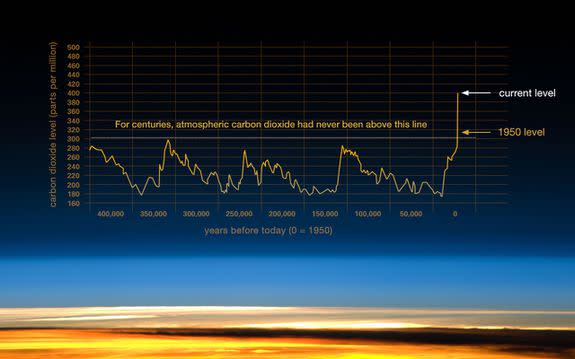Fighting climate change could save the world trillions of dollars

On the White House lawn in June 2017, President Donald Trump announced that "we're getting out," referring to his plan to pull the U.S. out of the historic Paris climate agreement — a deal he considers bad for the American economy.
But new research suggests that Trump is sorely mistaken.
The climate agreement, which is intended to limit the severity of climate change, will likely be a substantial benefit to most of the world's economies, argue researchers in a study published Wednesday in the journal Nature. Not placing limits on climate-warming carbon emissions, however, would be costly for nearly everyone.
SEE ALSO: Air conditioner use will triple by 2050. That's bad news for a warming planet.
The plan — which was even signed by North Korea — hopes to limit warming to less than 2 degrees Celsius (about 3.5 degrees Fahrenheit) above pre-industrial times, back in the 1800s when the atmosphere had substantially less carbon pollution.
Until now, there's been an inadequate understanding of how nations might fare economically from collectively meeting these climate goals.
To figure that out, researchers combed through both temperature and Gross Domestic Product (GDP) data from 165 countries between 1960 and 2010, finding that 90 percent of the global population will likely benefit from meeting the ambitious Paris carbon target of limiting warming to 1.5 Celsius (2.7 Fahrenheit).
Higher than average temperatures, they found, can drain economic productivity.

Image: nasa/Vostok ice core data/J.R. Petit et al.; NOAA Mauna Loa CO2 record
"As temperature's warm, output level falls," Marshall Burke, lead author of the study, said in call with reporters.
It's particularly important that scientists get some sense of how economies will respond in a warming world, in part, because the Earth's climate is already changing.
The planet may soon breach the 1-degree Celsius benchmark above pre-industrial levels, although some scientists think it already has.
It's unknown exactly how climate change will affect each and every country in the coming decades, said Burke, but he emphasized that "the benefits of meeting the stringent targets vastly outweigh the costs."
And it appears humanity has underestimated how large the magnitude of these costs — which include pummeling storms, declines in crop yields, and the spread of disease — truly is.
"As we further grasp the consequences of disrupting the fundamental environment on which modern civilization depends, projections of these costs continue to climb," Sarah Green, an environmental chemist at Michigan Technical University who was not involved in the study, said over email.
The National Oceanic and Atmospheric Administration (NOAA) found that in 2017 the U.S. "experienced a historic year of weather and climate disasters," with 16 separate billion-dollar disasters.
The world's three largest economies — the U.S., Japan, and China — are all expected to benefit from meeting the 1.5 Celsius carbon target, although the researchers found the poorest nations in the world, which are generally also the hottest, serve to benefit the most.
Overall, this means avoiding the nearly unfathomable losses of income associated with a warming climate. For example, if the world were to warm to between 2.5 and 3 degrees Celsius by the end of the century, the researchers project that global economic output would fall between 15 and 25 percent, which amounts to tens of trillions of dollars.
Some of this loss is caused by the direct impact of heat on our bodies.

Image: IMRAN ALI/AFP/Getty Images
"Humans function really well when the temperature is mild," said Marshall. He notes that heat makes us less productive, affecting labor output, cognitive abilities, and the fact that "people are more violent went you crank up the temperature."
Transforming massive, complicated economies to meet the 1.5 or 2 degree Celsius targets certainly won't be a simple, nor cheap, task.
Tearing down fossil fuel burning-power plants while constructing renewable energy infrastructure has a massive price tag, perhaps costing nations a considerable chunk the all the money they bring in each year, known more formally as Gross Domestic product, or GDP. (U.S. GDP in 2017 was over $19 trillion.)
If a country wanted to cut emissions in an extreme way, it would need to spend the equivalent of a few percentage points of GDP, David Victor, a professor of international relations at the University of California, San Diego who had no involvement in the study, said in an interview.
"That’s a lot of money," said Victor. "That’s the amount of money you spend on a war."
But, he notes, politicians nearly always emphasize the costs of energy transformation, often ignoring the economic benefits illustrated in this study.
Simply put, it costs money to make money.
And even if nations don't meet the 1.5 Celsius target, these benefits can still be momentous.
"It's not an all or nothing game," Kate Larsen, the former White House Council on Environmental Quality Deputy Director for Energy and Climate Change under the Obama Administration, said in an interview.
"There's a spectrum of impacts that go from pretty bad to only minor," she said. "There will still be impacts if we meet the Paris goals, but we would have avoided some of the most damaging consequences."
But not meeting the Paris goals, either the more stringent 1.5 degree or 2 degree Celsius targets, will likely hit nations in the place they care about most: their wallets.
"Temperature affects the fundamental building blocks of economies," said Marshall.
WATCH: NASA is attempting to fly a helicopter on Mars for the first time

